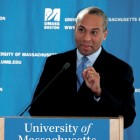| Hamlet the Passive Intellect |
| Bostonkorea 2010-11-26, 20:21:57 |
|
By Lee, JeeEun( Phillips Academy 12) Hamlet's over-intellectualization begins with his questioning of the ghost's identity. When first told by Horatio that the ghost of his father haunts the battlements, Hamlet interrogates him obsessively to obtain every relevant detail to satisfy his intellectual curiosity. He fires a volley of questions at Horatio, ranging from whether his countenance is “pale or red” to how long it “fixed eyes upon [Horatio]” (1.2.250). His desire to dispel uncertainty and further his knowledge escalates in the physical encounter with the ghost. Rather than accepting his vision for granted, Hamlet examines the validity of his perceptions by debating whether the ghost of “a questionable shape” is “wicked or charitable” (1.4.45-46). Hamlet initially pronounces to the ghost that he will “wipe away all trivial, fond records, all saw of books, all forms, all pressures past, that youth and observation copied there,” declaring his resolution to act (1.4.108). However, when he reconvenes with his friends, he entreats them “never make known what you have seen tonight” (1.5.160). Instead of seeking for an immediate collective action to avenge his father’s “unnatural murder,” he chooses to prolong the process to devise an elaborate scheme within his own mind. He forestalls action—be it his friends’ or his own—to contemplate the implications of his experience. He concludes by cursing the fact that he “was born to set it right” (1.5.211). The ghost’s revelation places him in a position where he must be the agent of action, whose filial responsibility is to affect justice and kill Claudius. Hamlet’s dilemma, then, stems from the need to become an avenging son while being a naturally passive intellectual. Hamlet addresses his dilemma in greater depth by engaging in a rigorous, intellectual process, which ironically perpetuates the vicious cycle of inactivity. In his conversation with Rosencrantz and Guildenstern, he confesses, “thinking makes it so. To me it is a prison” (2.2.270). Hamlet finds himself imprisoned by his intellect, as he “must like a whore unpack [his] heart with words” (2.2.614). He cannot act by heart because he is bound to “unpack” his actions with reason first. He berates himself as “a rogue and peasant slave” and “John-a-dream, unpregnant of my cause, and can say nothing” (2.2.576-595). Hamlet recognizes that he is not taking any decisive action to dutifully avenge his father’s death in staying within his comfort zone of intellectualism. As he articulates and explores his conflict of conscience, he concludes, “Thus conscience does make cowards of us all and thus the native hue of resolution is sicklied o’er with the pale cast of thought, and enterprises of great pitch and moment…lose the name of action (3.1.91-96). Hamlet reaffirms that his constant moralizing and philosophizing stymie the very action he strives for. The inexorable clash between his predisposition for sedentary contemplations and the filial imperative to actively seek revenge results in such strong feelings of self-loathing that he considers “shuffl[ing] off the mortal coil” (3.1.75). Committing suicide would proactively end his suffering, but he problematizes even that possibility as an unacceptable transgression against “[God’s] canon ‘gainst self-slaughter! ” (1.2.136). Ironically, this very soliloquy devoted to meditating on his passivity epitomizes his inaction; rather than coming up with pragmatic solutions to end his dilemma, he explores and wallows in self-pity, which in turn exacerbates the intensity of his conundrum. Hamlet is so preoccupied with the enormous intellectual activity in his head that he closes himself off from all action in the external world. Hamlet fails to escape the prison of his own intellect even when presented with the perfect opportunity to end his dilemma. When Claudius retires to his private prayer, he admits that “his hand” is “thicker than itself with brother’s blood” and declares that he cannot be redeemed “since [he is] still possessed of those effects for which [he] did the murder,” all within earshot of Hamlet who is hidden behind the curtain (3.3.58). The curtain represents the boundary between the external world of action and Hamlet’s internal world of intellectualism and contemplation. Though Claudius leaves Hamlet with no question of his guilt and no excuse for inaction, Hamlet maintains that his impending act “would be scanned,” pointing out the need to analyze the situation further within the border of his consciousness (3.3.80). Hamlet knows that Claudius’s murder will end his inner dilemma by physically removing its source; however, his intellectual mind ponders whether he would really be revenged if Claudius were killed “in the purging of his soul when he is fit and seasoned for his passage” (3.3.91). By virtue of his intellectual nature, Hamlet demands knowledge of afterlife and of God before taking any action. In a short declarative “No,” he resolves to kill Claudius in a less contrite moment (3.3.92). Similar to his reservations about killing himself, Hamlet ‘s moral meditations paralyze him, and he willfully forgoes the opportunity for retribution; Hamlet merely opts to contemplate the moral consequences of his potential action. Hamlet’s reflective tendencies blunt his filial imperative at the most opportune moment to avenge his father, as he passively seeks the “right” moment to exact vengeance. Hamlet’s excessive moralizing hinders his ability to confront his father’s murderer directly, but the resulting frustration with himself ironically prompts him to take action – any action – no matter how feckless. In the wake of his failure to kill Claudius, Hamlet proceeds circuitously toward revenge by accosting Gertrude, but their initial confrontation degenerates into mere word play that neither moves their conversation forward nor directly reveals his knowledge of the truth to his mother. Her speech, “Hamlet, thou hast thy father much offended” is immediately mirrored by his bitterly sardonic yet roundabout retort: “Mother, you have my father much offended” (3.4.15). As Hamlet becomes increasingly frustrated by his inability to articulate his disdain for his incestuous mother, he lashes out violently in a misguided attempt to compensate for his own passivity. Incapable of coordinating his thoughts and actions, Hamlet rashly “thrust[s] a rapier through the arras,” reflecting his confusion rising from frustration with his cowardly self (3.4.29). Hamlet’s first foray into the world of action, cutting through the veil of his inner thought processes, results in the impulsive killing of an innocent through the piercing of the curtain – an action that Hamlet cannot explain. He can only vainly hope, “Is it the king?” reiterating his desire to gain revenge without taking full agency in the process (3.4.32). Hamlet is so distrustful of acting rationally that his revenge is more likely to come about as a mere accident than as a pre-meditated act; the murder of Polonius is essentially a cowardly compromise to allay his dilemma. Hamlet’s last words to Polonius’s lifeless corpse may just as well be directed at himself as Hamlet calls Polonius a “wretched, rash, intruding fool” (3.4.39). Even the ghost of Hamlet’s dead father comes to reproach him for his “blunted purpose,” echoing the fecklessness of his indirect attempt to affect justice (3.4.127). As Hamlet becomes increasingly aware of his own inadequacy, the urgency of the moment compels him to act blindly and irresponsibly. The murder of Polonius seemingly sets Hamlet’s “actions” into motion, but Hamlet, in essence, refuses to exercise full agency of his father’s revenge. He again determines that “[his] thoughts be bloody” (4.4.69). Indeed, merely his thoughts, not physical actions, can and will be bloody. In explaining the situation behind the murder to Laertes, Hamlet distances himself from his own act by saying, “If Hamlet from himself be ta’en away, and when he’s not himself does wrong Laertes, then Hamlet does it not; Hamlet denies it. Who does it, then? His madness” (5.2.249-251). By blaming his madness for Polonius’s death, he denies premeditating his act and thereby refuses to give it full credence. In fact, he declares himself the victim of “the faction that is wronged,” rather than the agent of action (5.2.252). In the final scene, Hamlet cannot take decisive action against the King, resorting merely to wounding him with the poisoned blade rather than stabbing him outright. For once, Hamlet does confront Claudius as an “incestuous, murd’rous, damned Dane,” before making him drink the poison (5.2.366). However, even this action is not fully motivated from within, but is extrinsically compelled due to his impending mortality. At the moment of his death, Hamlet says, “had I but time, I, I could tell you—but let it be” (5.2.368-370). He delegates the responsibility for telling of his tales to Horatio, hiding behind the excuse of not having enough time to do it himself. Then, it is no coincidence that Fortinbras, a man with a clear sense of purpose and forceful activity, takes over crown of Denmark, as Hamlet’s physical strength fades away. Hamlet the intellectual is too beset by moral and philosophical considerations and uncertainties to proactively avenge his father. As Hamlet senses the urgency of his dilemma, he sinks further into despair and internal indecision, ultimately resorting to a feckless compromise by blindly attempting feeble action. Ironically, Hamlet reasons that the noble ability to intellectualize is what separates man from beast and that his reason will lead him from his apathetic state into action: "What is man if the chief good and market of his time be but to sleep and feed? A beast no more. Sure He that made us with such large discourse, . .gave us not that capability and godlike reason to fust in us unused" (4.4.35-41). As the play unfolds, it is precisely his excessive intellectualism and reasoning that impedes any effective action as a civilized man and spurs him to act like a beast. Ultimately, Hamlet faces his demise due to his over-contemplation, his unwillingness to venture out to the world of action. |
 |
 의견목록 [의견수 : 0]
의견목록 [의견수 : 0]
|
 |
| 등록된 의견이 없습니다. | |
|
|
 프리미엄 광고
프리미엄 광고

161 Harvard Avenue, Suite 4D, Allston, MA 02134
Tel. 617-254-4654 | Fax. 617-254-4210 | Email. [email protected]
Copyright(C) 2006-2018 by BostonKorea.com All Rights Reserved.
Designed and Managed by Loopivot.com























